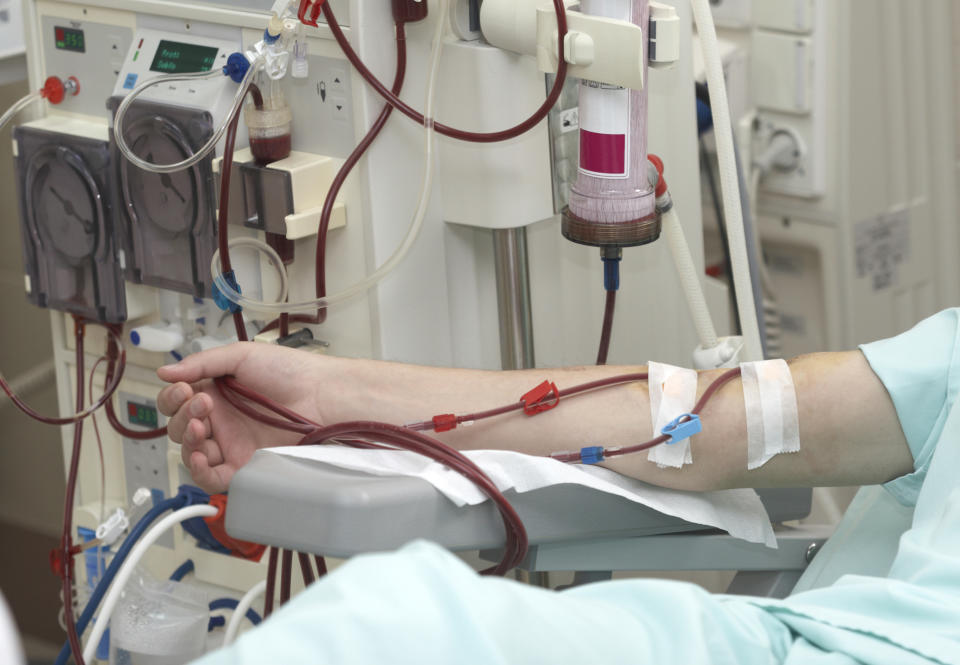Alphabet's AI May Have Just Made Its Biggest Healthcare Breakthrough
Artificial intelligence, or AI, has gotten a lot of press over the past several years, promising to revolutionize everything from business to healthcare. The ability of AI-based deep learning algorithms to detect patterns that would easily escape their human counterparts has potential applications that boggle the mind.
The technology has already been used to power chatbots, smart speakers, digital assistants, movie and purchase recommendations, and much more.
Now, researchers with Alphabet's (NASDAQ: GOOGL) (NASDAQ: GOOG) DeepMind AI lab, working with the U.S. Department of Veterans Affairs, have made the type of breakthrough most scientists only dream of: The lab's AI is able to predict a life-threatening kidney ailment a full 48 hours before the condition becomes critical.

AI can now help prevent acute kidney injury. Image source: Getty Images.
Acute Kidney Injury
The condition, known as acute kidney injury (AKI), often results in the need for dialysis or a kidney transplant once it occurs. The disorder, which can cause sudden kidney failure or damage, kills as many as 2 million patients annually. AKI occurs in one in five hospitalized patients and is often notoriously difficult to detect because it typically doesn't present any symptoms.
Conversely, if the condition is detected early enough, it is easy to treat before it becomes life-threatening.
Can AI Save the Day?
DeepMind researchers developed the system after training its deep learning algorithm by reviewing the records of more than 703,000 VA patients. It's worth noting the VA is the largest medical system in the U.S., serving more than 9 million patients across 1,255 facilities.
The results, which were published in the medical journal Nature, revealed that researchers were able to predict the condition in patients up to 48 hours earlier than it is currently being diagnosed. The algorithm was also able to detect 90% of the most serious cases -- those that would have resulted in dialysis if the condition had gone undetected.
One downfall of the technology is that it wouldn't provide a mechanism to notify medical professionals of the situation. In a separate peer-reviewed study, DeepMind evaluated its mobile medical assistant app called Streams.
Time Is of the Essence
Working with researchers at University College London, DeepMind scientists tested Streams using an existing national AKI algorithm to escalate deteriorating patient cases at the Royal Free London hospital. Using Streams, specialists were able to review critical cases within 15 minutes or fewer (which normally might have taken two hours), resulting in fewer instances of AKI being missed -- down to only 3%, compared to the 12% missed without the app.
The app also helped reduce the average cost of a hospital stay by more than 17%, which would be an immediate selling point for the technology, as the U.K.'s National Health System spends more than 1 billion pounds (about $1.2 billion) each year treating AKI.
It's important to note that the AKI algorithm and the Streams notification system are two building blocks in DeepMind's long-term plans toward preventative healthcare, and they're being tested separately -- Streams doesn't yet employ the new AKI algorithm developed by DeepMind.

AI can also help detect breast cancer. Image source: Getty Images.
Making Medicine More Efficient
Developments such as these won't be replacing doctors anytime soon, but they can help detect life-threatening situations sooner. DeepMind and Google have developed a number of groundbreaking systems over the past several years, including one that beat human pathologists at detecting cancer, while another could detect a damaged retina that could lead to blindness. AI has also been tapped to more accurately sequence the human genome.
While many of these systems are still in various stages of testing, it's clear that with all of its potential applications in medicine, AI could save your life one day.
More From The Motley Fool
Suzanne Frey, an executive at Alphabet, is a member of The Motley Fool's board of directors. Danny Vena owns shares of Alphabet (A shares). The Motley Fool owns shares of and recommends Alphabet (A shares) and Alphabet (C shares). The Motley Fool has a disclosure policy.
This article was originally published on Fool.com
